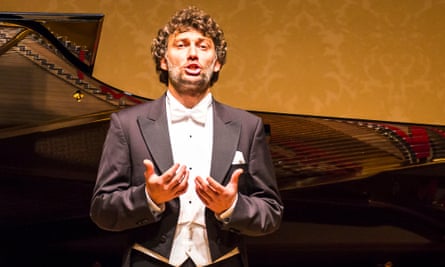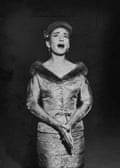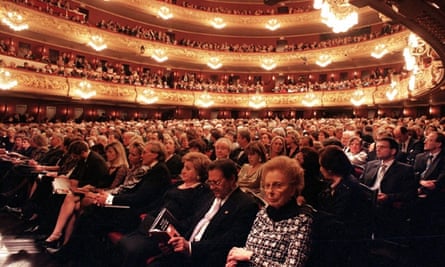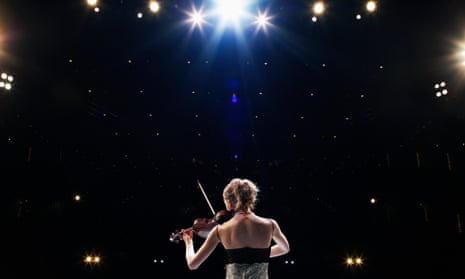Jonas Kaufmann was 26 when he forgot how to sing. Kaufmann, who headlines at the Last Night of the Proms on Saturday alongside soprano Danielle de Niese and pianist Benjamin Grosvenor, is today a hugely acclaimed and in-demand tenor, described by the New York Times as one of the most versatile performers of his generation. But 20 years ago, he experienced a bout of stage fright so crippling it almost ended his career.
Kaufmann was singing in Richard Wagner’s Parsifal. With Act III approaching its climax, his voice simply deserted him. He stood paralysed, unable to utter a single sound, as the orchestra repeated his cue and the conductor gestured to him in increasing bemusement.

Kaufmann’s moment of paralysis was a common symptom of extreme performance anxiety, a physiological reaction to nerves which manifests itself as hoarseness and, at worst, losing the ability to sing altogether. He was, of course, able to overcome it after working with a vocal coach who helped him rebuild his technique so he felt completely secure in it, and thus confident on stage.
Kaufmann’s experience is more common among professional musicians than you might think. While some seem apparently immune to the pressures of a crowd, many of the greatest soloists in history – from Maria Callas to Vladimir Horowitz – have struggled to deal with performing under intense expectation. Horowitz grew to detest the stress involved so much that he retired on multiple occasions. Singers including Ella Fitzgerald, Paul McCartney and Barbara Streisand have all been afflicted. Frederic Chopin, the darling of many a concert hall in his day, once wrote, “I am not fitted to give concerts. The audience intimidates me. I feel choked by its breath, paralysed by its curious glances.”

“It’s not a natural thing to do, going out and dealing with such high levels of stress in public,” says Aaron Williamon, professor of performance science at the Royal College of Music. “And it’s nothing to do with age or inexperience. No matter how highly skilled a person is, the body’s preprogrammed stress responses mean they can enter a different physical state and sometimes even a different psychological state.”
At the Royal Northern College of Music, Professor Jane Ginsborg has a particular method for explaining this to her students. She asks them to write down what it feels like to fall in love, then, much later, write down what it feels like to stand backstage moments before a performance. Love and fear seem like contrasting emotions, but the descriptions most students will write for each are eerily similar. The bottom line is that the body has only one way of knowing excitement.
It’s why almost every soloist will experience the physical symptoms of music performance anxiety to some degree, particularly in the moments before walking on stage. At its very worst, this anxiety causes the heart rate to rapidly drop, resulting in the player simply freezing or even fainting on the spot.
Most common is the “fight or flight” response, less severe than freezing, but it can still stimulate a vicious cycle. The nervous system pumps two hormones, adrenaline and noradrenaline, into the bloodstream. When their levels get sufficiently high, it leads to physical reactions such as higher heart rate, muscle tremors and increased blood flow from the stomach to the muscles, causing nausea and the feeling we describe as “butterflies”.
If controlled appropriately, these hormonal imbalances can lead to a heightened state of awareness, and a more powerful performance. But given the fine muscle movements and coordination behind musical technique, too much can impair technique, leading to increased anxiety and panic, followed by concentration and memory lapses, and more stress.
“Everybody has their own symptoms, which are instrument-specific,” Ginsborg says. “Pianists will talk about their fingers sweating, string players will talk about their bows shaking, singers refer to a dry mouth.”

The degree to which we experience these reactions depends on a complex mix of genetic and environmental factors. Anxiety can be partly inherited through the mother’s hormone levels, but also stimulated by perceived traumas at an early age. Sarah Solovitch, pianist and author of Playing Scared: A History and Memory of Stage Fright, attributes her fear of performing to her mother’s obsession with her daughter becoming a professional soloist. As a child, Solovitch was chased round the kitchen table with a spoon until she practised.
Some experience this stress response to a far lesser degree, a natural advantage to handling pressure. But psychologists and performance tutors believe every aspiring soloist can develop coping mechanisms to control their own individual anxiety.
“Some people may have more of a mindset for pressure, but there’s a lot of training that can go into it,” Williamon says. “It’s the way you interpret that different physical state which makes all the difference. Instead of seeing it as a signal that something’s going to go wrong, they should treat the symptoms as a sign that your body’s is ready to perform.”
Learning to view fear as a form of positive arousal is a mantra of cognitive behavioural therapy. However, performers such as Solovitch, who attribute their anxiety to early experiences that have subconsciously affected them, may benefit more from psychodynamic approaches that examine why we feel how we do.
But given the individualism of the symptoms, Ginsborg feels many teachers are prone to pushing students towards whatever techniques worked for them; the former head of vocal studies at Royal Northern College of Music once suggested that every singer in the department could benefit from psychotherapy. “The kind of approach you need depends on the symptoms, the cause and what makes sense to you, regarding your own particular experiences,” she says.
A recent study of 44 professional soloists aimed to identify some of the most common thought processes used to deal with pressure. Some focused on physical aspects such as consciously controlling their breathing or pedalling. Others repeatedly reflected on successful past performances. However, the majority achieved a state of relaxation by completely internalising themselves in various aspects of the music, seeing different phrases almost as various passages in a story, an approach known as narrative thinking. This helps deal with one of the most common sources of performance stress, the need to commit in minute detail an entire piece to memory.
“This requires a certain type of practice, where you completely disentangle what the composer’s written, reducing it to the bare bones of the harmonies and why certain things have been embellished the way they have,” says Joanna MacGregor, head of piano at the Royal Academy. “That way you climb right inside the music, and it gives you a deeper, more solid foundation. You focus less on how you’re feeling because you’re absolutely embedded inside the music.”
But the perennial catch-22 with learning how to deal with pressure is that such training can only take place in front of an actual audience or audition panel, with something on the line. This can be a brutal place to go through the motions of learning to deal with such feelings.
To understand how to help aspiring soloists at the Royal College of Music develop the necessary resilience required, Williamon sought ideas from a field where the stakes are about as high as they can get. “Today, trainee surgeons often learn their trade in a virtual operating theatre,” he says. “They work on mannequins with realistic-looking wounds, with just the right auditory and visual cues at the right times, to draw the surgeon into the same physical and psychological mode as in an actual operation.”
Inspired by this, he created the world’s first virtual concert hall, complete with backstage area, backstage manager and green room. Everything is replicated as it would be in a real-life performance, with 30- and 15-minute countdowns, the door opening, and the applause rippling through to backstage.
“As they walk out, they’re hit by spotlights and they can see a virtual interactive audience or an audition panel that’s waiting there, ready for them to play,” Williamon says. “The idea here is that we’re allowing them the freedom to rehearse dealing with that pressure while still in a safe environment.”
Since launching, the virtual concert hall has yielded promising results. But while virtual reality may herald a new frontier in training performers in the art of dealing with pressure, MacGregor believes there’s still one aspect that has to be absolutely inherent, the underlying drive to showcase your talent.
“Even if you’re nervous, to make it as a performer you still need to welcome the opportunity to sit in front of an audience and play to them,” MacGregor says. ”Of course, there’s lots of training needed to be physically and mentally prepared, and emotionally flexible enough to be comfortable and creative on stage, but ultimately there has to be the desire to go out there and fly.”

Comments (…)
Sign in or create your Guardian account to join the discussion